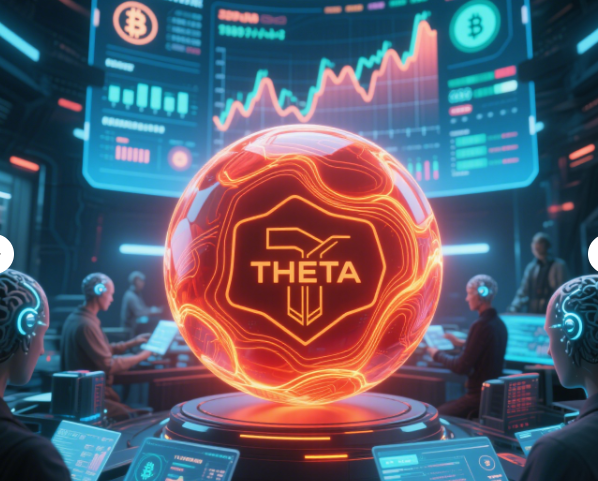Featured News
THETA's Evolution: How Decentralized Video Streaming is Shaping the Future of Web3 Media
2025/06/09 05: 31
Platforms like YouTube and Twitch have grown into digital empires, yet their centralized infrastructure is burdened by soaring bandwidth demands. Enter THETA Network
Redefining Content Delivery: Why THETA Is More Than Just a Token
In an age dominated by video, users are increasingly frustrated with buffering issues, central server outages, and escalating content delivery costs. Platforms like YouTube and Twitch have grown into digital empires, yet their centralized infrastructure is burdened by soaring bandwidth demands. Enter THETA Network, a decentralized peer-to-peer (P2P) video delivery ecosystem that’s not only solving these inefficiencies—but is pioneering the Web3 transformation of online streaming.
Developed by Theta Labs and supported by media giants like Sony, Samsung, and Google, THETA combines blockchain tech with a real-world use case: streaming video. By decentralizing data delivery and rewarding users for sharing unused bandwidth, THETA reduces content delivery costs by up to 80%, as highlighted in a Theta Network Whitepaper.
Solving High-Cost Infrastructure With Peer-Powered Streaming
The traditional Content Delivery Network (CDN) model struggles to scale affordably. Research by Cisco predicts that video traffic will constitute 82% of all IP traffic globally by 2026. THETA’s edge lies in its Edge Nodes—devices run by users that cache and relay video content near consumers. This not only reduces latency but improves streaming quality, especially in underserved regions.
A 2023 performance benchmark conducted by the Blockchain Research Institute demonstrated that THETA's P2P model increased video start-up times by 30% and reduced rebuffering events by 50%, compared to centralized CDNs. These improvements directly enhance user experience and cut operational costs for content platforms.
Powering the New Creator Economy with Micropayments
One of the major pain points for video creators is monetization dependence on ad revenue and platform policies. THETA introduces a tokenized incentive structure where viewers earn TFUEL tokens for sharing bandwidth, and creators can monetize directly through staking, NFTs, and subscriptions.
This new economy is proving viable. According to a report from Messari (2024 Q3 Report on Web3 Media), over 1.2 million wallets interacted with THETA smart contracts, and transaction volume in creator-based tokens surged by 187% year-over-year. It underscores how decentralized models empower creators with autonomy and audience ownership—previously impossible in traditional streaming setups.

Enterprise-Grade Adoption: A Sign of Credibility
A major user concern in blockchain projects is sustainability and real-world utility. THETA has addressed this with strategic alliances. Sony’s Spatial Reality Display, for instance, uses THETA’s infrastructure for immersive content distribution. Similarly, Samsung has integrated THETA TV into its smart TVs, extending decentralized video access to millions of households.
What makes this significant is not just brand association but technical validation. A joint paper by MIT Media Lab and Theta Labs (2022) evaluated THETA’s consensus mechanism—Multi-BFT—finding it to be “highly resilient under dynamic network conditions,” a key trait for real-time applications like video.
Investor and Developer Interest: Is THETA Undervalued?
Despite strong fundamentals, many retail investors still ask: "Is THETA undervalued?" The coin has been volatile, but on-chain metrics show growth. According to Santiment, active addresses on the THETA blockchain increased by 62% over the last 12 months, and staking participation reached 61% of circulating supply, signaling long-term holder confidence.
From a developer standpoint, the recent launch of the Theta EdgeCloud—a decentralized AI compute platform—has also sparked new use cases, from rendering deepfake detection models to generative AI video generation. These extensions push THETA beyond streaming into broader Web3 infrastructure services, widening its value proposition.
Challenges Ahead: What THETA Must Overcome
While its architecture is promising, THETA still faces hurdles in mass adoption and regulatory clarity. Latency improvements are not uniform globally, and onboarding users to run Edge Nodes requires user education and hardware incentives. Moreover, cross-border streaming rights and NFT licensing remain legal grey zones.
However, THETA’s ongoing work with the Decentralized Media Alliance, a think tank of legal and technical experts, aims to address these. Their 2024 position paper outlines a framework for global compliance in decentralized video content delivery—signaling that the team is not just innovating, but also anticipating legal evolution.
Final Thoughts: Why THETA Matters Now More Than Ever
In a digital landscape increasingly dominated by centralized platforms and algorithmic control, THETA offers a paradigm shift—empowering both creators and viewers through decentralization, tokenization, and edge computing. Its utility goes beyond hype and speculation; it solves real-world inefficiencies and supports a more equitable media ecosystem.
As the Web3 movement matures, networks like THETA are no longer optional—they’re inevitable. They represent the infrastructural backbone of decentralized internet experiences. Whether you're an investor, a developer, or a content creator, ignoring THETA might mean missing the evolution of video itself.
Coin78 will continue to monitor THETA’s evolution, helping our readers stay ahead in this fast-moving frontier of decentralized media.
Author Bio
Dr. Elara Min is a blockchain strategist and tokenomics advisor specializing in decentralized infrastructure and Web3 media. With over a decade of experience in digital innovation, she has contributed to thought leadership in organizations including the Blockchain Research Institute and several Layer 1 foundations. Her research focuses on P2P economics, NFT governance, and the intersection of AI with distributed systems.
Disclaimer:
1. The information content does not constitute investment advice, investors should make independent decisions and bear their own risks
2. The copyright of this article belongs to the original author, and only represents the author's personal views, not the views or positions of Coin78. This article comes from news media and does not represent the views and positions of this website.
1. The information content does not constitute investment advice, investors should make independent decisions and bear their own risks
2. The copyright of this article belongs to the original author, and only represents the author's personal views, not the views or positions of Coin78. This article comes from news media and does not represent the views and positions of this website.
 USD
USD CNY
CNY HKD
HKD TWD
TWD VND
VND USDT
USDT